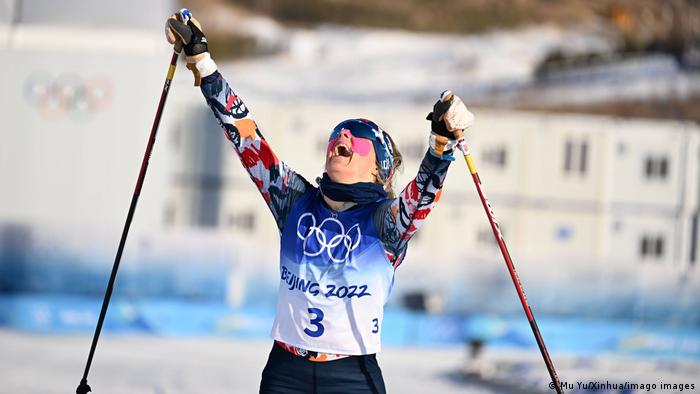
Norwegian cross-country skier Therese Johaug won the first gold medal of the Beijing Olympics on Saturday and hosts China claimed a thrilling victory as sport moved centre stage after a troubled build-up.
Johaug was a comfortable winner of the women’s 7.5-plus-7.5-kilometre skiathlon.
The 33-year-old, who was ruled out of the 2018 Winter Games after failing a doping test for a substance in a lip balm, had to dodge coronavirus after two of her Norwegian teammates tested positive before travelling to these Games.
“At first I was really happy just to come here because we have the Covid in our team,” Johaug said after finally winning an individual Olympic title at her third Games.
“I’ve trained thousands of hours for this and been away from home a lot over the years so it’s beautiful to reach this goal.”
Dinigeer Yilamujiang, a 20-year-old Uyghur who was chosen by China as one of two athletes to light the cauldron in Friday’s opening ceremony, finished 43rd in the skiathlon race.
Yilamujiang’s inclusion in a ceremony watched by a worldwide television audience placed her at the centre of long-time controversy over rights abuses in China’s Xinjiang region.
Campaigners say China has incarcerated at least one million people from mostly Muslim minorities, notably Uyghurs, in “re-education camps” in Xinjiang.
The United States, Britain, Canada and Australia are among countries staging a diplomatic boycott of the Games over China’s rights record, and particularly the fate of the Uyghurs.
Asked whether the inclusion of a Uyghur competitor in the ceremony met the International Olympic Committee’s standard of political neutrality, IOC spokesman Mark Adams said she had “every right” to participate.
“As you’ll know from the Olympic Charter, we don’t discriminate against people on where they’re from, what their background is,” he said.
China won their first gold of the Games when their quartet claimed victory in the short track speed skating mixed relay on the event’s dramatic Olympic debut.
The Chinese almost failed to reach the final but were reprieved when the United States were penalised for blocking by an infield skater.
Cheered on by a small but enthusiastic crowd of several hundred at the Capital Indoor Stadium, China crossed the line ahead of Italy.
– White bowing out –
Shaun White, the American snowboarder who has defined his sport, announced he would retire after he competes in Beijing at his fifth Olympics.
White, three times a gold medallist in the halfpipe, said there were “little signs” that his 35-year-old body was telling him time was up.
“It’s this now, it’s that now — it’s all these little things adding up that’s taking away from days of practice that I would normally have,” he said.
Canada’s Mikael Kingsbury, considered the best moguls skier in history, was stunned by 21-year-old Swede Walter Wallberg under the floodlights in Zhangjiakou, just outside Beijing.
Kingsbury was a strong favourite to retain the title he won four years ago, but Wallberg put down a stunning run to beat the Canadian and become Sweden’s youngest Winter Olympic champion for 58 years.
“Wallberg, with the pressure on, put down the best run of the day and props on him,” said a gracious Kingsbury.
Ursa Bogataj came from behind to win the women’s individual ski jump title — Slovenia’s first ever gold medal in the sport.
Norway earned their second gold of the day in biathlon, triumphing in the 4×6-kilometre mixed relay.
– High-speed rush –
On Sunday Aleksander Aamodt Kilde is the favourite in the high-speed men’s downhill — traditionally one of the highlights of a Winter Olympics.
Kilde’s girlfriend Mikaela Shiffrin meanwhile admitted she would be disappointed to leave Beijing without a medal, but the American skier warned it was impossible to have a flawless Games.
Shiffrin is one of the headline acts at Beijing 2022 as she pursues a third gold after winning in slalom at the 2014 Sochi Olympics and giant slalom four years later in Pyeongchang. Her first race is the giant slalom on Monday.
“I’ve never in my life had three weeks where I had no regrets and no disappointment,” Shiffrin said.
“At the Olympics it’s impossible to have the perfect two weeks.”
The Games are taking place inside a vast “closed loop” bubble designed to thwart Covid-19.
The nearly 3,000 athletes and tens of thousands of support staff, volunteers and media are cut off from Beijing’s general population and tested daily. Masks are compulsory.
The number of Covid cases in the bubble rose above 350 Saturday, among them an unknown number of athletes.
Germany’s three-time Olympic nordic combined champion Eric Frenzel will miss his first event on Wednesday because he tested positive on arrival in Beijing, his team said.
AFP





